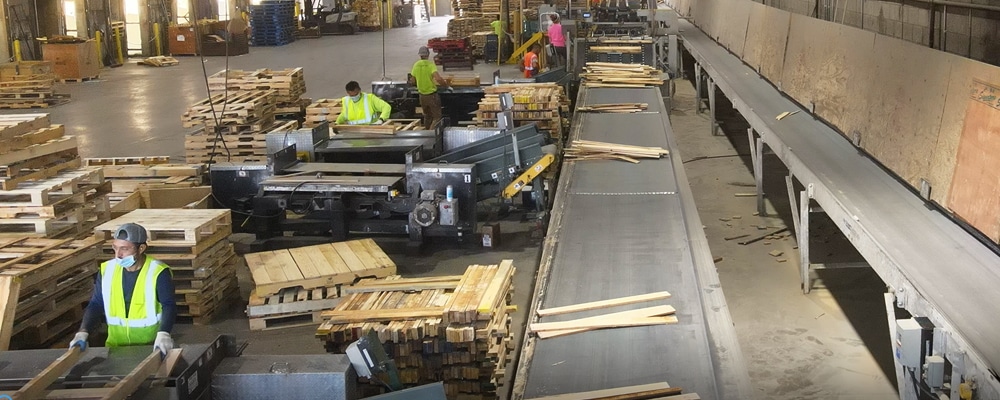Supply Chains are continuously evolving. Large grocery chains, automotive manufacturers, and e-commerce platforms are harnessing their supply chains to improve warehousing, the end customer experience, and environmental sustainability.
One of Kamps’ priorities is to be a platform that is continuously improving its capabilities to better support our customer’s evolving needs. A key component of our ability to do so involves anticipating trends and establishing best practices that will support our customers today, tomorrow, and in the distant future.
We have identified five trends that are shaping the supply chains of tomorrow; along with the importance of partnering with a pallet company that has the means and will to evolve with your supply chain.
For each, we have also included initiatives Kamps has implemented that enable us to support these practices and your business.
- Increased Visibility
- Standardized Systems and Quality Control
- Increased Focus on Sustainability
- Digitization
- Strong Relationships
Increased Visibility
There are only a handful of items more important to supply chain managers than visibility and transparency. Increased visibility allows supply chain managers to understand their supply chain on the highest levels, as well as each link in the chain. Increased visibility can improve the efficiency, reliability, and value of the supply chain – especially when it comes to pallets. A lack of visibility in pallet programs can lead to delivery delays, order errors, and loss of revenue from pallet recycling programs.
At Kamps, we appreciate the value of visibility and have implemented industry leading transparency practices across the board.
Our Increased Visibility & Transparency for Supply Chains
- Load & Sort Reports generated by trailer number that outline every pallet received
- Variety of reports outlining each pallet purchased or sold by Kamps
- Annual Business Reviews with key pallet program data and figures
- Automated order delivery updates
- Transparent sorting and grading standards for cores pulled
Standardized Systems and Quality Control
As supply chains continue to grow and add elements of automation, standardization in regards to pallets becomes increasingly important.
Let’s say that your organization has hundreds of warehouses, storing thousands of SKUs, across the United States. Each warehouse uses the same software systems and robotics that helps automate the process of picking, storing, and palletizing items. In order for this process to operate successfully nationwide, pallet quality, dimensions, and composition need to be standardized. If there is no standardization, pallets delivered can vary based on locations – or from order to order. This can lead to issues with pallets being unable to properly support products or work within your automated process
Standardization is also important in regards to data and reports being generated regarding your pallet program. Working with multiple pallet suppliers, or those without standardized reporting, can lead to missing data or increase the workload for your organization. Consolidating your pallet program underneath one, standardized, roof ensures your reporting is consistent, reliable, and usable with your systems.
Kamps, we have standardized systems and processes across all locations. That means every location uses the identical quality control protocols, systems of data collection and reporting, and general service guidelines.
Increased Focus on Sustainability
As consumers continue to prioritize the environment, sustainable business practices have become a much higher priority. Some organizations have even developed internal sustainability teams that implement, monitor, and report on sustainability efforts.
Most major airliners have made net-zero carbon commitments; with shipping and logistics company Fedex making commitments to being net-zero natural by 2040.
In order for organizations to reach these sustainability goals, supply chains will need to implement environmentally friendly practices at each level. One avenue that can add value to supply chains in regards to sustainability specifically is pallets.
For example, end-of-life pallet recycling processes that Kamps implements have been proven to off-set the carbon released during a pallet’s entire life cycle.
Partnering with a pallet company, such as Kamps, whose sustainability philosophy aligns with yours can provide value to your sustainability team, brand, and end customers.
Our Sustainability Practices and Achievements
- 2023 Green Supply Chain Partner Recognition
- Over 390 million pallets recycled annually
- Over 20.2 million trees, 7.1 million tons of landfill waste, and 10.8 million tons of CO2 saved in 2021
- Commitment to reducing paper waste with online KP Portal and invoicing
- Optimized fleet to lower trip time and carbon emissions
Digitization
In a world that is continuously becoming more digitized, supply chains are following suit. A fully digitized supply chain is more streamlined, mobile, and dynamic.
Through our own digital initiatives, Kamps has positioned itself to be the industry leading pallet company for digitized supply chains.
Kamps Digitization for Supply Chains
- Digitally connected and optimized transportation fleet
- On-demand digital reports and invoices available via KP Portal
- Robust, proprietary, systems for tracking operations and KPIs
- In-House IT staff with proprietary software and API development capabilities
Video: Introduction to our KP Portal
Strong Relationships
While the common thread between the previous trends has been technology, the most important aspect to the supply chains of tomorrow are the humans wielding it.
A strong relationship with a pallet supplier ensures that your organization’s best interests and expectations are always at the forefront of every decision. It also ensures that information is being communicated at all times and service requests are handled with a sense of urgency.
At Kamps, we have been delivering industry-leading customer service since 1973. We build strong, long-term, relationships. We place the success of our customers as the highest priority.
This is all achieved through the consultative approach we take to every pallet program; where our experts analyze your entire supply chain and identify areas of improvement. With our continuous monitoring and market analysis, this also means that your pallet program with Kamps is built to last and optimized at all times.



